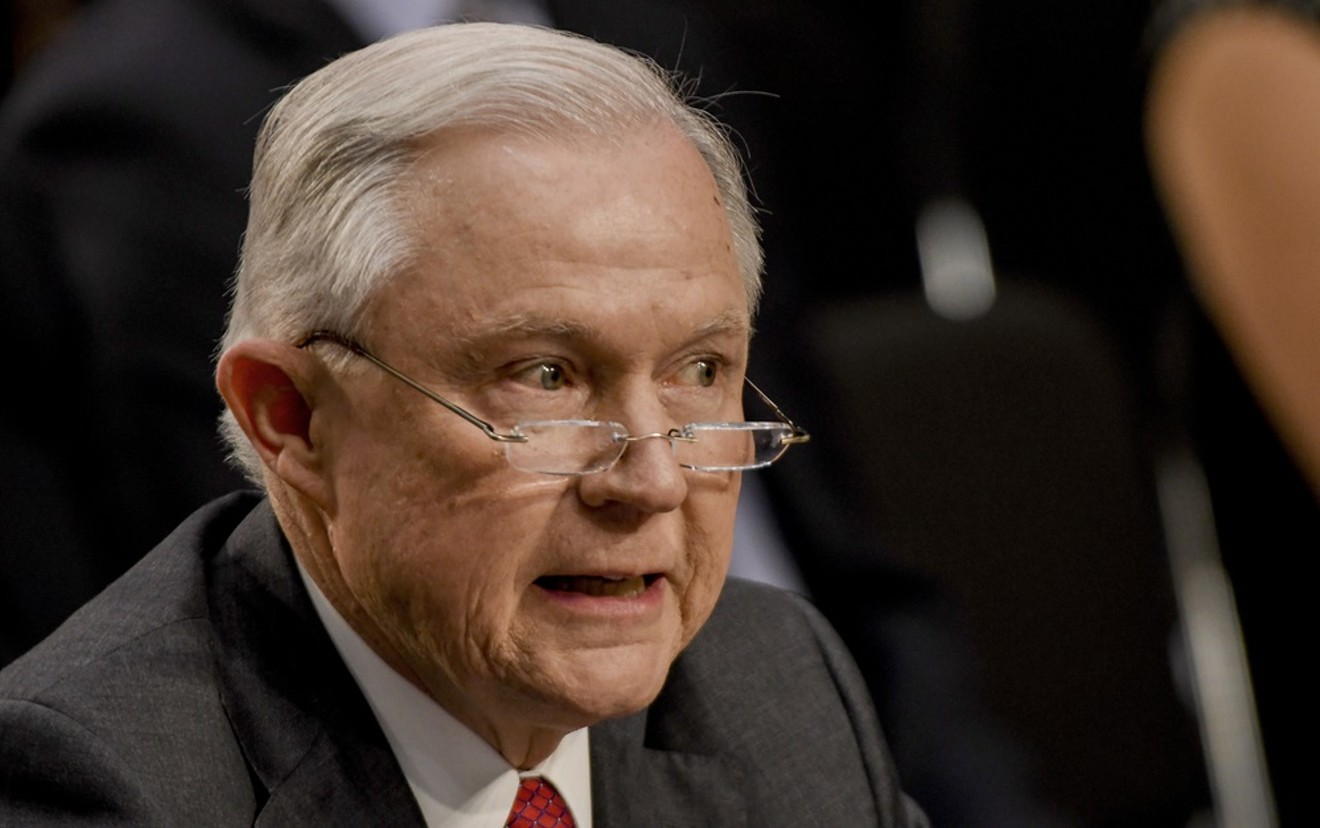United States Attorney General Jeff Sessions testified in front of a House Judiciary Committee on Tuesday, November 14, for more than four hours, answering questions about alleged Russian interference in the 2016 election, Planned Parenthood, and his department's investigation of black extremist groups. Sessions's comments in response to those queries all created headlines, but there was one more hot-button issue he couldn't avoid: pot.
Despite the AG's public disdain for legalizing marijuana, he conceded that the United States Department of Justice wouldn't interfere with state cannabis programs. “Our policy is the same, really, fundamentally, as the Holder-Lynch policy, which is that the federal law remains in effect and a state can legalize marijuana for its law- enforcement purposes," he told Ohio Representative Steve Chabot. "But it still remains illegal with regard to federal purposes.”
Sessions was grilled several times regarding his beliefs about legal pot and how his department plans to deal with it. Tennessee congressman Stephen Cohen, alluding to the Rohrabacher-Farr Amendment — a provision that prevents the Justice Department from using federal funding to undermine state pot programs — asked if Sessions and the Justice Department would "abide by congressional appropriations and limitations" on cannabis enforcement.
“I believe we are bound by that,” Sessions answered. In June, a letter from Sessions surfaced in which he asked congressional leaders not to renew the Rohrabacher-Farr amendment so that he could use federal funding to potentially persecute those participating in state-legalized medical marijuana programs.
And that wasn't the only question that Cohen had for the AG. He also asked Sessions about his comments in March that severely downplayed pot's potential role in decreasing opioid use, and got Sessions to admit that cannabis wasn't as dangerous as at least one opioid. “Marijuana is not as dangerous as heroin — do you agree with that?” Cohen asked.
“I think that’s correct,” Sessions responded.
Cohen continued to press the AG, quoting a study showing that states with medical marijuana saw an average 25 percent reduction in opioid use. "Put your enforcement on crack, on cocaine, on meth, on opioids, and on heroin. Marijuana is the least bothersome of all,” he told Sessions.
Sessions has faced criticism regarding his positions on cannabis since he became AG in January. In October, the Brookings Institution published an essay condemning him for blocking the licensing of federally sanctioned medical marijuana growing operations for research purposes. In April, the governors of Alaska, Colorado, Oregon and Washington sent a letter to Sessions and Secretary of the Treasury Steven Mnuchin, asking them to respect states' rights and to consult with state governments operating under Obama-era marijuana protections before making any enforcement changes.
The Justice Department has yet to make any changes in its enforcement of legalized pot, but the AG's response to the four governors voiced his concerns with commercializing marijuana. After meeting with Sessions, Colorado Governor John Hickenlooper told cannabis-industry members that the AG would come down like a "wall of rain" if the industry had a big growth spurt.
[
{
"name": "Air - MediumRectangle - Inline Content - Mobile Display Size",
"component": "12017618",
"insertPoint": "2",
"requiredCountToDisplay": "2"
},{
"name": "Editor Picks",
"component": "17242653",
"insertPoint": "4",
"requiredCountToDisplay": "1"
},{
"name": "Inline Links",
"component": "18838239",
"insertPoint": "8th",
"startingPoint": 8,
"requiredCountToDisplay": "7",
"maxInsertions": 25
},{
"name": "Air - MediumRectangle - Combo - Inline Content",
"component": "17261320",
"insertPoint": "8th",
"startingPoint": 8,
"requiredCountToDisplay": "7",
"maxInsertions": 25
},{
"name": "Inline Links",
"component": "18838239",
"insertPoint": "8th",
"startingPoint": 12,
"requiredCountToDisplay": "11",
"maxInsertions": 25
},{
"name": "Air - Leaderboard Tower - Combo - Inline Content",
"component": "17261321",
"insertPoint": "8th",
"startingPoint": 12,
"requiredCountToDisplay": "11",
"maxInsertions": 25
}
]












